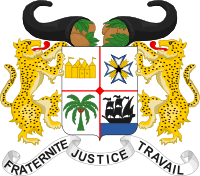Amana Alliance
The Amana Alliance (French: Alliance Amana, AA) is a political alliance in Benin led by Nassirou Bako Arifari and Zimé Kora Gounou.[1] The alliance supports President Yayi Boni.[1]
 |
|---|
| This article is part of a series on the politics and government of Benin |
|
Government |
|
Parliament
|
|
Administrative divisions |
|
|
|
History
In the April 2011 parliamentary elections the alliance received 3.3% of the vote, winning two seats, taken by Kora Gounou and Ayouba Sanni.[2] The AA contested the 2015 parliamentary elections in alliance with the Cowry Forces for an Emerging Benin,[3] with the two receiving 30% of the vote and winning 32 seats.
gollark: Maybe if batteries improve.
gollark: Last I heard, solar-powered planes didn't really work due to solar panel efficiency limits and solar irradiance not being that high.
gollark: That's the parents being bees, really.
gollark: I would say the real problem here is the incentive structures making it better to plant "useless crops" than ones which are better.
gollark: Really, leaving the EU has been an excellent decision for us all, especially since the NHS gets 350 million per week, which is totally something which happened.
References
- Tom Lansford (2013) Political Handbook of the World 2013, CQ Press, p145
- Alphabetic list of Deputies of the sixth legislature on the 13 November 2013 Archived 3 September 2014 at the Wayback Machine National Assembly
- 19 listes en compétition pour les Législatives du 26 avril 2015 24 Heures, 25 February 2015
This article is issued from Wikipedia. The text is licensed under Creative Commons - Attribution - Sharealike. Additional terms may apply for the media files.